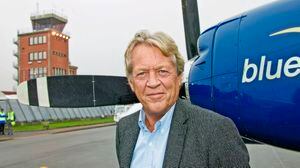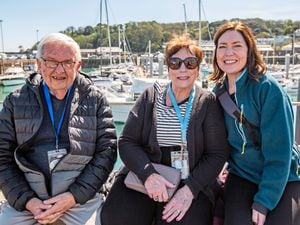Open skies policy idea ‘is perilous’
MOVING to an open skies policy would be ‘highly perilous and destructive to Guernsey’s future air links’, Blue Islands’ chairman has said.

Derek Coates has written to Economic Development president Charles Parkinson warning against the ‘unintended consequences’ of scrapping the current route licensing structure.
The committee wants to move to a ‘quasi open skies’ policy where operators serving any route apart from lifeline ones will be exempt from the need to hold a Guernsey air transport licence.
‘The review proposes that only Gatwick and Alderney will continue to be licenced and therefore be afforded protection from predatory competition,’ said Mr Coates. ‘The de-regulation of air route licencing will almost certainly, as seen in the Isle of Man, lead to operator’s cherry picking soft target routes on a seasonal basis to best suit the optimisation of their own business.
‘We could see predatory behaviour on key routes such as Manchester and Southampton, resulting in a short term booming of capacity, and perhaps to short-term reductions in fares to unsustainable levels below cost, and the subsequent bust of a market participant at the point when losses become untenable.’
He said Guernsey is ‘fortunate to have two indigenous carriers who are willing to lose money for the sake of their island’.
However, this willingness has its limits and Blue Islands, Aurigny and, as a result, islanders would suffer adversely from the proposed changes, he predicted.
‘In an open skies scenario, an operator could begin to fly Manchester, Bristol and other Aurigny routes at peak summer times only with no requirement to operate year-round,’ he said.
‘This additional competition would undermine Aurigny’s performance during this period and jeopardise the summer season profitability required to support their year-round schedule.
Aurigny could then be forced to reduce their year-round frequency to mitigate their losses in the quieter season and placing the year-round connectivity that islanders currently enjoy in danger.’
‘[Another example] is if another significant carrier came on the Guernsey-Jersey route at peak times, where both Aurigny and ourselves used to lose unsustainable amounts of money, Blue Islands would no longer be obliged to maintain its flight frequency. It would therefore cut unprofitable flights at times when there is low demand such as the middle of the day, thereby reducing Guernsey’s connectivity and frequency.’
Mr Coates said the current licensing regime protects the island from a ‘nightmare scenario’ of reduced connectivity.
‘Until such time as we see exogenous changes such as population increases, hotel bed stock increases, a repositioning of ‘product Guernsey’ in the inbound tourism sector and an increased propensity to travel from local residents, these licencing safeguards are essential if Guernsey is to maintain the year-round network of services that it enjoys today,’ he said.
‘The constant comparison to Jersey is fundamentally flawed, Jersey’s population is 66% larger than Guernsey’s, some 42,000 residents. This relative difference is felt acutely when both markets are sub-scale.’
‘A straight comparison between these two markets is clearly not appropriate. Even if one deems the open skies policy in Jersey a success, there is no reasonable grounds on which to expect a similar policy in Guernsey would meet with the same success.’
Mr Coates said his observations were based on his time in the local industry and that he hoped Economic Development would consider his representation before making their final decision.
‘Since 2004 I have continually invested in developing and evolving the Blue Islands airline business from an Alderney-based operator of 2 Islander/Trislander aircraft, to the 5 ATR operator that it is today, operating some 580,000 seats per annum to and from our Channel Islands. This business has required in excess of £45m. of personal investment, well outside the context of a typical investor’s rational investment criteria,’ he said.
‘I have done this because I want Guernsey’s economy to prosper.’
‘We base our entire fleet exclusively in the Channel Islands, providing the greatest level of operational resilience in times of inclement weather disruption and this results in the retention of some 100 locally based employees. Would newcomers do the same?’
‘Blue Islands understands that roughly a third of seats operated to and from Guernsey are empty. This shows the commitment of the current operators to ensure a level of schedule frequency and service level above purely commercial considerations.’





